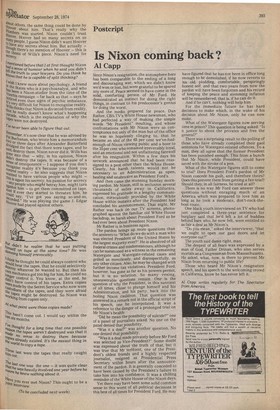Is Nixon coming back?
Al Capp
Since Nixon's resignation, the atmosphere here has been comparable to the ending of a long and discouraging war, which we didn't know we'd won or lost, but were grateful to be spared any more of. Peace seemed to have come in the solid, comforting person of Mr Ford. He demonstrated an instinct for doing the right things, in contrast to his predecessor's genius for doing the worst. And the media prepared for peace. Dan Rather, CBS-TV's White House newsman, who had perfected a way of making the simple words "Mr President" insulting, and whose confrontations with Mr Nixon were so contemptuous not only of the man but of the office he was so hopelessly clinging to, that he became an idol of the 65 per cent we've-hadenough-of-Nixon viewing public and a boor to the 35 per cent who remained irreversibly loyal, said an emotional and not unflattering farewell after his resignation. Within a few days his network announced that he had been reassigned to a post other than the White House. Clearly, his harsh talents would not be necessary to an Administration as open, healing and unabrasive as President Ford's. And then came the stunning Sunday morning pardon. Mr Nixon, still in seclusion several
• thousands of miles away in California, expressed his gratitude in a lengthy communication, miraculously provided by the White House within instants after the President had concluded his announcement. That night, Mr Rather was back on our TV screens, photographed against the familiar old White House backdrop, as harsh about President Ford as he had ever been about President Nixon.
Mr Rather is in business again. The pardon brings up more questions than the answers to "What do we do with a man who was elected President of the United States by the largest majority ever?" He is absolved of all Federal crimes and misdemeanours, although he can be summoned as a witness in the remaining Watergate and Watergate-related cases and grilled as mercilessly, and disrespectfully, as any other citizen. Also, he may be changed with further income tax violations. President Ford, however, has gone as far as his powers permit, but it is no solution. So many vexing, unanswerable questions remain. One is the question of why the President, in this sunniest of all times, chose to plunge himself and his Administration, and his party, back into the boiling Nixon cauldron. That question was answered in a remark not in the official script of his speech, one he interpolated. It was a reference to the danger of a prolonged trial on Mr Nixon's health: 'Did he mean the possibility of suicide?" one of a panel of journalists asked. No one on the panel denied that,possibility. "Was it a deal?" was another question. No one denied that possibility. 'Was it a deal made privately before Mr Ford was selected as Vice-President?" Some doubt was expressed about the truth of that, but it was true that Mr terHorst, one of the President's oldest friends and a highly respected journalist, resigned as Presidential Press Secretary within hours after the announcement of the pardon. It is generally conceded to have been caused by the President's failure to take him into his confidence. It was a chilling reminder of the White House of the Nixon days.
Yet there may have been some solid common sense to this worst of all political decisions in this best of all times for President Ford. He may have figured that he has not been in office long enough to be demolished, if he now reverts to his old, plodding, comfortable, perspiringly honest self, and that two years from now the pardon will have been forgotten and his record of keeping the peace and stemming inflation will be remembered; that is, if he can do it.
And if he can't, nothing will help him.
For the immediate future he has hard decisions to make which, in the wake of his decision about Mr Nixon, only he can now make.
What of the Watergate figures now serving time in prison? This question is being asked: "Is it justice to shoot the privates and free the general?"
There was a surprising result to the polling of those who have already completed their gaol sentences for Watergate-related offences. To a man, they all agree that the former President has been punished enough. This from a bunch that Mr Nixon, while President, could have saved with the stroke of a pen.
What of the Watergate figures still to come to trial? Does President Ford's pardon of Mr Nixon concede his guilt, and therefore theirs? Does this prevent them from getting a fair trial? Should they, in all fairness, be tried at all?
There is no way Mr Ford can answer these questions without enraging much of an America which was prepared to love him as long as he took a moderate, don't-rock-theboat route.
One black youth interviewed on TV who had just completed a three-year sentence for burglary said that he'd left a lot of buddies behind bars who, he now felt, were entitled to as fair a deal as Mr Nixon's.
"Do you mean," asked the interviewer, "that we ought to open our gaol doors and let everyone out?"
The youth said damn right, man.
The deepest of all fears was expressed by a man of God, Father Drinan, who also serves mortals as a Congressman from Massachusetts. He asked, what, now, is there to prevent Mr Nixon from returning to public life?
Those who heard Mr Nixon's resignation speech, and his speech to the welcoming crowd in California, know he has never left it.
Al Capp writes regularly for The Spectator from America


































 Previous page
Previous page